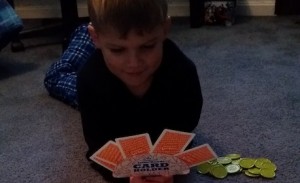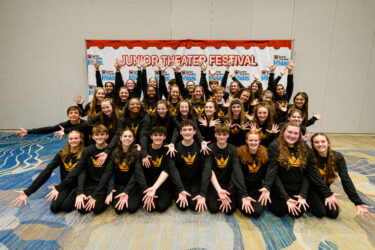In one of my first few years of teaching I walked into a classroom where half of the kids were happy as can be and the other half were upset, pouting, or crying. I asked the teacher what had happened and she replied in two words, “GAME DAY.” The kids that lost did not know how to handle losing. They were used to playing games at home and always winning. From that point on I swore that when I had children I would never “let” them win.
My husband and I are very competitive, so it came as no surprise that our son is just as competitive. At 3 he started playing soccer and at his first game he cried…like full on meltdown ugly cried…when the other team scored. To say he was a poor sport was an understatement. It was then that we decided we needed to work on his sportsmanship at home. Enter family game nights. Every night after our kids put on their jammies and brush their teeth, we play a board game. At first it felt like a chore-picking a game, setting it up, going through the meltdown, cleaning it back up, and then going on with our bedtime routine. However, now we all look forward to whose turn it is to pick the game, guessing what game they will choose, and spending time together.
My husband and I are tough competitors. We don’t “let” either of our kids win…or each other! If they win it is because they earned it! We don’t want our kids to expect to win. We want them to understand that hard work can lead to a win, but even with hard work sometimes you still lose. We want them to put forth their best effort in everything they do. Winning seems sweeter when you don’t win every time. Believe me, I love seeing the look on their faces when they win a game and it breaks my heart when they are upset over a loss. However, it is important to us that they “practice” winning and losing gracefully at home where we can coach and help them through it.
My husband and I both work full-time, so our daily game nights are a time we can all spend together. Not only do we practice good sportsmanship while playing, but we are also teaching our kids: one to one counting, turn taking, colors, numbers, fine motor skills, language and vocabulary, and how to set up a sweet mouse trap. We have watched our son mature in his last few sports sessions. He is no longer crying when the other team scores and he is cheering on his teammates. He is even more competitive then he was before as he wants to earn that win! He also serves as a great example to our two year old who is starting to develop her competitiveness!
Some of our favorite family games and the lessons they can learn while playing:
Guess Who: Language/vocabulary as they learn to recognize facial features and asking questions.
Operation: Great game for body awareness and fine motor control! Our 2-year-old loves hearing the board buzz … our 5-year-old, not so much.
Sequence/Sequence Letters: Great game to teach strategy and for learning about animals too! Sequence letters is a bit harder … great for kids working on recognizing what letter a word starts with or just letter recognition.
The Sneaky Snacky Squirrel Game: This game works fine motor skills as you have to use the squirrel tweezers to pick up colored acorns … the colored acorns are great for practicing color recognition.
Cheese Dip: Great for color recognition, patience as you wait until your color is rolled, recognizing letters, and spelling words.
Perfection: We play this game as one team! It is great to mix it up sometimes .. so we have to work together to win versus just one person winning.
How Tall Am I?: Great for learning body awareness and math concepts of tall/short and measuring.
Hullabaloo: Great game for getting little bodies moving. Kids have to listen to the directions to see what/where they are hopping/spinning/crawling to next. Great for auditory processing!
LCR: A fun way to learn directionality! Left … Center … Right!
Battleship: I was surprised to see how well our 5-year-old picked up this game! He is great at reading coordinates and coming up with a strategy.
Mouse Trap: Mouse Trap is a great game to teach cause and effect. What happens when you knock over the marble? As well as fine motor … no one wants to knock the marble over on accident!
All games by Peaceable Kingdom: We are working on teaching our kids how to win and lose gracefully, but it is also important to learn how to work together and to reach a goal. Peaceable Kingdom games are a great way to teach cooperation through play!





